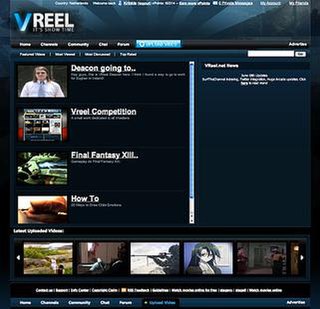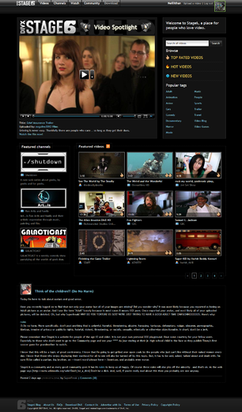
DivX is a brand of video codec products developed by DivX, LLC. There are three DivX codecs: the original MPEG-4 Part 2 DivX codec, the H.264/MPEG-4 AVC DivX Plus HD codec and the High Efficiency Video Coding DivX HEVC Ultra HD codec. The most recent version of the codec itself is version 6.9.2, which is several years old. New version numbers on the packages now reflect updates to the media player, converter, etc.

Xvid is a video codec library following the MPEG-4 video coding standard, specifically MPEG-4 Part 2 Advanced Simple Profile (ASP). It uses ASP features such as b-frames, global and quarter pixel motion compensation, lumi masking, trellis quantization, and H.263, MPEG and custom quantization matrices.

DivX, LLC is a privately held video technology company based in San Diego, California. DivX, LLC is best known as a producer of three codecs: an MPEG-4 Part 2-based codec, the H.264/MPEG-4 AVC DivX Plus codec and the High Efficiency Video Coding DivX HEVC Ultra HD codec. The company's software has been downloaded over 1 billion times since January 2003. DivX, LLC's offerings have expanded beyond the codec to include software for viewing and authoring DivX-encoded video. DivX, LLC also licenses its technologies to manufacturers of consumer electronics devices and components used in these devices, of which over 1 billion DivX-enabled devices have shipped worldwide. DivX certifies that these licensed products are able to properly play DivX-encoded video.

ffdshow is an open-source unmaintained codec library that is mainly used for decoding of video in the MPEG-4 ASP and H.264/MPEG-4 AVC video formats, but it supports numerous other video and audio formats as well. It is free software released under GNU General Public License 2.0, runs on Windows, and is implemented as a Video for Windows (VFW) codec and a DirectShow filter.
Google Video was a free video hosting service, originally launched by Google on January 25, 2005.

The Core Pocket Media Player (TCPMP) is a software media player which operates on portable devices and Windows-based PCs. It is discontinued, but still available from the official mirror site. Supported operating systems include Palm OS, Symbian OS, and Microsoft Windows, CE, and Mobile. It is also available on Microsoft's Zune HD via a hack called Liberate. TCPMP also has hardware accelerated playback for ATI and Intel 2700G mobiles, such as the Tapwave Zodiac and Dell Axim X50v/X51V.
SubRip is a free software program for Microsoft Windows which extracts subtitles and their timings from various video formats to a text file. It is released under the GNU GPL. Its subtitle format's file extension is .srt and is widely supported. Each .srt file is a human-readable file format where the subtitles are stored sequentially along with the timing information. Most subtitles distributed on the Internet are in this format.
The following tables compare general and technical information for a number of current, notable video hosting services. Please see the individual products' articles for further information.

Blip was an American media platform for web series content and also offered a dashboard for producers of original web series to distribute and monetize their productions. The company was founded on May 5, 2005, and it was located in New York City and Los Angeles. It was financed by Bain Capital Ventures, Canaan Partners, and Ambient Sound Investments. Blip's mission statement was "to deliver the best original web series to audiences across multiple platforms." The site showcased a wide variety of dramas, comedies, arts, sports and other shows. Blip was acquired by Maker Studios in 2013 and shut down by them on August 20, 2015.

Veoh is an American video-sharing website, launched in September 2005. It was originally launched as a virtual television network application, and then became a video-sharing website in March 2006. During the mid-2000s, it was one of the largest video-sharing websites, though eventually began to be superseded by YouTube, Vimeo and Dailymotion. In February 2010, the company filed for Chapter 7 bankruptcy, until it was saved two months later by the technology company Qlipso Inc. It was later sold to blogging host FC2, Inc, who still own it as of October 2021.

TinyPic was a photo- and video-sharing service owned and operated by Photobucket.com that allowed users to upload, link, and share images and videos on the Internet. The idea was similar to URL shortening, in that each uploaded image was given a relatively short internet address. An account was not required to use TinyPic.

VReel was a video sharing web site that allowed users to upload, share and view high resolution videos by use of a proprietary video codec. The site was in open beta in an effort to replace the now defunct Stage6 site with a viable alternative. Using a similar style to Stage6, VReel also received a licence from DivX, Inc. to use their video codec, and signed an agreement with Edgecast to distribute the web site globally.

aXXo is the Internet alias of an individual who released and standardized commercial film DVDs as free downloads on the Internet between 2005 and 2009. The files, which were usually new films, were popular among the file sharing community using peer-to-peer file sharing protocols such as BitTorrent. A download-tracking firm BigChampagne found — in a sampling period in late 2008 — that almost 33.5% of all movie downloads were aXXo torrents. aXXo encoded files to approximately 700 MB – the same size for a compact disc. Due to the re-encoded quality of an aXXo file, the suffix "aXXo" was often used by imitators.
DivX Plus HD, launched in 2009, is the brand name for the file type that DivX, Inc. has chosen for their high definition video format. DivX Plus HD files consist of high definition H.264/MPEG-4 AVC video with surround sound Advanced Audio Coding (AAC) audio, wrapped up in the open-standard Matroska container, identified by the .mkv file extension. DivX Plus HD files leverage and extend on Matroska's ability to support multiple language tracks, subtitles, chapters, and additional bonus content.

IO Group, Inc. v. Veoh Networks, Inc., 586 F. Supp. 2d 1132, is an American legal case involving an internet television network named Veoh that allowed users of its site to view streaming media of various adult entertainment producer IO Group's films. The United States District Court for the Northern District of California ruled that Veoh qualified for the safe harbors provided by the Digital Millennium Copyright Act (DMCA), 17 U.S.C. § 512 (2006). According to commentators, this case could foreshadow the resolution of Viacom v. YouTube.

Joox was a video link site that allowed users to find online video content. Created in 2007, it was the world's first popular website that streamed divX material from the host and provider stage6. A relatively small number of streaming video sites were known when Joox first launched, and none used the divX format. It had no problem getting a wide user base because of the superior video quality and ease of use.

CineAsset was a complete mastering software suite by Doremi Labs that could create and playback encrypted and unencrypted DCI compliant packages from virtually any source. CineAsset included a separate "Editor" application for generating Digital Cinema Packages (DCPs). CineAsset Pro added the ability to generate encrypted DCPs and Key Delivery Messages (KDMs) for any encrypted content in the database. It has since been discontinued, along with CineAsset Player.

UMG Recordings, Inc. v. Shelter Capital Partners LLC, 667 F.3d 1022 No. 09-55902, was a United States Court of Appeals for the Ninth Circuit case in which UMG sued video-sharing website Veoh, alleging that Veoh committed copyright infringement by hosting user-uploaded videos copyrighted by UMG. The Ninth Circuit upheld the decision of the United States District Court for the Central District of California that Veoh is protected under the Digital Millennium Copyright Act's safe harbor provisions. It was established that service providers are "entitled to broad protection against copyright infringement liability so long as they diligently remove infringing material upon notice of infringement".
An online video platform (OVP) enables users to upload, convert, store, and play back video content on the Internet, often via a private server structured, large-scale system that may generate revenue. Users will generally upload video content via the hosting service's website, mobile or desktop application, or other interfaces (API), and typically provides embed codes or links that allow others to view the video content.
This is a timeline of online video, meaning streaming media delivered over the Internet.














